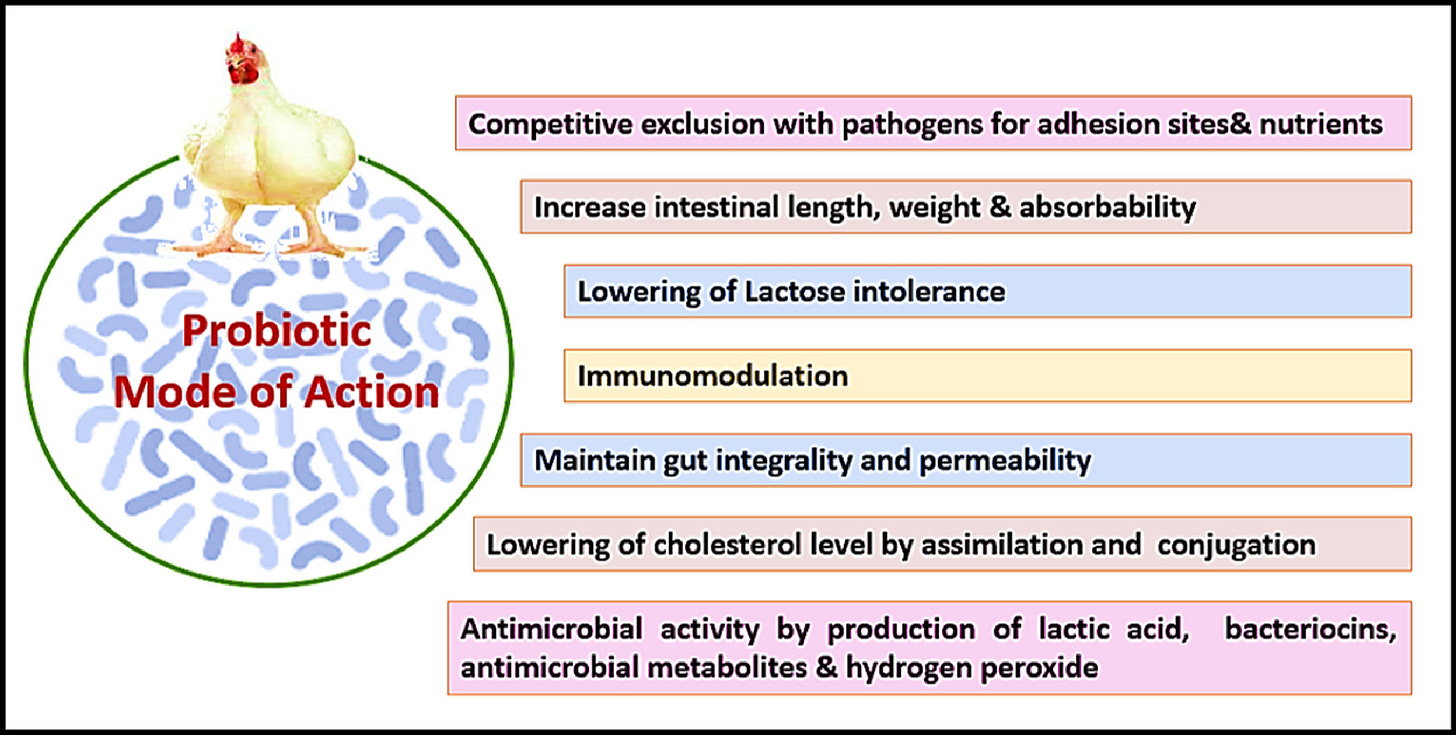Probiotics vs Pathogens & Viruses
Just a last little tidbit regarding poultry pathogens and viruses.
Global research is currently being done to determine how probiotics may affect immune function and reduce the risk of particular diseases, like respiratory and gastrointestinal disorders. There is evidence that probiotics have direct antiviral effects. However, research into these effects is still in its early stages, so it might take some time before experts can precisely identify the probiotics' direct antiviral mechanisms.
I get a bit excited to see this research come out. It provides more validation of what I have seen in my years working with probiotics. While writing my book, I found some papers that had been retracted as their original conclusion that “probiotics don’t work” has been proven wrong, and these papers were only about ten years old. This shows that technology is improving, allowing scientists to see more and more.
Research suggests specific probiotic strains may have some antiviral activity against specific viruses. For instance, numerous Lactobacillus species have been proven to inhibit the replication of rotavirus, a significant cause of diarrhea in children. The findings of other studies showing various probiotics may have antiviral advantages against respiratory viruses like influenza and rhinovirus need to be confirmed by additional research.
Image from Mohamed et al.
[Avian Influenza] “decreases the proliferation of certain beneficial bacteria, such as Enterococcus, Lactobacillus, and other probiotic microorganisms.”(Abd et al., 2022) So, Avian Influenza suppresses the beneficial microbes in the gut. Having this effect means that adding probiotics would at least encourage birds' gut health and possibly counteract the suppression effect. Abd et al. conclude, “Gut microbiota, including different species of Lactobacillus, Blautia Bifidobacterium, Faecalibacterium, Clostridium XlVa, and members of firmicutes, play a significant role in the prevention and control of AIV and other infections.” (Abd et al., 2022)
“Substantial research efforts have focused on unraveling the beneficial role of LAB, particularly Lactobacillus species, in growth performance and infection control. The immunomodulatory activities of probiotic bacteria lie, in part, in their ability to induce cytokine production, which in turn leads to the regulation of innate and adaptive immune responses. Probiotic LAB used in chickens has been shown to induce intestinal mucosal immunity [38], in addition to a systemic immune response characterized by an increase in total serum antibody titers and a significant alteration in the expression of various immune system genes associated with splenic B and T cells [18,31,32,33,39,40], which can lead to protection of chickens against AIV.”(Alqazlan et al., 2020)
These papers show that probiotics not only cause changes in the gut environment and stimulate the immune system but can also act specifically to AIV and protect the bird. This suggests that regular application of probiotics can help protect birds against AIV.
“Probiotics initially act by colonizing persistently in the host and then modulating the commensal microbiota to restore the normal microbiota balance in the host system, exhibiting an immunomodulatory effect by enhancing the antiviral immune response and/or activating other protective mechanisms by upregulating the antiviral response of non-immunological host mechanisms, which are considered as the indirect mechanism exhibited by the probiotics to eradicate the viral infections. Producing metabolites that have the ability to restrict the viral multiplication or metabolites that are competing against the pathogens is the direct mechanism of probiotics to eradicate pathogens.”(Kesika et al., 2021)
Current research shows that probiotics, especially mixed species of microbes, stimulate various bodily functions, whether in the gut or inhaled, as in the study by Tomosada et al. Combining these functions helps to out-compete the pathogen and improve the host's immune system to fight off the pathogen in question. From this, regular supplementation will likely help our animals fight off pathogens. The ways to do this are to add the probiotics to the animal’s food or drinking water and to regularly spray down areas where they will spend most of their time.
We used to do this with our commercial clients by injecting the probiotics into the water lines at a rate of 1 to 2000 and spraying down the bedding area (or pasture) with one fluid ounce per gallon of water and spraying weekly or monthly, depending on the concentration of animals. People who pasture their birds can spray the pasture once per month at a rate of 1 gallon per acre mixed in with irrigation water or a sprayer for coverage. In some future issues, I will cover the benefits of probiotics to humans. There is much more research to explore and have some fun with.
Are you taking probiotics?
Resources
Abd El-Hack, M. E., El-Saadony, M. T., Alqhtani, A. H., Swelum, A. A., Salem, H. M., Elbestawy, A. R., Noreldin, A. E., Babalghith, A. O., Khafaga, A. F., Hassan, M. I., & El-Tarabily, K. A. (2022). The relationship among avian influenza, gut microbiota and chicken immunity: an updated overview. Poultry science, 101(9), 102021. https://doi.org/10.1016/j.psj.2022.102021
Alqazlan, N., Alizadeh, M., Boodhoo, N., Taha-Abdelaziz, K., Nagy, E., Bridle, B., & Sharif, S. (2020). Probiotic Lactobacilli Limit Avian Influenza Virus Subtype H9N2 Replication in Chicken Cecal Tonsil Mononuclear Cells. Vaccines, 8(4), 605. https://doi.org/10.3390/vaccines8040605
Kesika P, Sivamaruthi BS, Thangaleela S, Chaiyasut C. The Antiviral Potential of Probiotics—A Review on Scientific Outcomes. Applied Sciences. 2021; 11(18):8687. https://doi.org/10.3390/app11188687
Mohamed E. Abd El-Hack, Mohamed T. El-Saadony, Heba M. Salem, Amira M. El-Tahan, Mohamed M. Soliman, Gehan B.A. Youssef, Ayman E. Taha, Soliman M. Soliman, Ahmed E. Ahmed, Attalla F. El-kott, Khalid M. Al Syaad, Ayman A. Swelum. Alternatives to antibiotics for organic poultry production: types, modes of action and impacts on bird's health and production. Poultry Science, Volume 101. Issue 4, 2022, 101696. ISSN 0032-5791. https://doi.org/10.1016/j.psj.2022.101696.(https://www.sciencedirect.com/science/article/pii/S0032579122000013)
Tomosada, Y., Chiba, E., Zelaya, H. et al. Nasally administered Lactobacillus rhamnosus strains differentially modulate respiratory antiviral immune responses and induce protection against respiratory syncytial virus infection. BMC Immunol 14, 40 (2013). https://doi.org/10.1186/1471-2172-14-40




